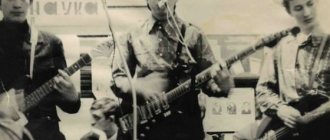A man from Kadyrov’s entourage, who established contacts with Libya and Indonesia, is a former founder of a Belarusian boy band. Now his business card says that he is the head of the contact group of the Russian Foreign Ministry on Libya, Lev Dengov. Previously, his name was different - Pavel Guzband, although he no longer responds to this name even among his family. Telegram channels and media became interested in his person after he began dating A-Studio vocalist Keti Topuria. However, they were able to find out little: the biography of the 35-year-old diplomat is as incredible as it is vague. A GQ correspondent met with Dengov himself to fill in at least some of the gaps. Since not everything he said can be verified, and obligations prevent us from sharing something, we leave everything stated on the conscience of the narrator.
Biography
Russian show business and the general public learned about the existence of Lev Dengov when the name of the mysterious stranger appeared next to the name of the A-Studio star Keti Topuria. The famous singer published a romantic photo together on Instagram, after which her fans and those simply interested in social news rushed to look for a man tenderly kissing the beauty on the nose. And they found him.
Childhood and youth
The biography of the new lover of the “A-studio” vocalist is woven from white spots. It is known that Dengov was born on June 8, 1984 in Belarus. But in what city he was born, who his parents are and whether he has brothers and sisters is still a mystery.
Diplomat Lev Dengov / News.ru
Close attention to Topuria’s chosen one from the media and curious fans gives hope that gradually the biographical gaps will be filled with reliable information.
Lev Dengov: the aggressor today is Haftar
Moscow is ready to provide a platform for a peaceful resolution of the crisis in Libya, Lev Dengov, head of the Russian contact group on intra-Libyan settlement, said at the Valdai international discussion club. According to him, Russia now has a unique position, since work is carried out with all parties to the conflict, without preference to anyone. News.ru talked with Lev Dengov about Libyan prospects.
— As you mentioned during the discussion at Valdai, Russia is not betting on any side in the Libyan conflict. Nevertheless, Haftar regularly flies to Moscow. For what purposes, what does he receive from the Russian authorities?
— It is premature to say that Haftar is receiving help from Moscow. The fact that he comes here to show the world his contacts with Russia is very important for his own reputation. We, in turn, can state that the Western side, the Government of National Accord, Faiz Sarraj, Ahmed Maityg, are also communicating with us. Therefore, Haftar today is just an inclusive partner in building relations with Libya and in the peace process. Yes, his propaganda is much stronger, due to the work of his lobbyists, who are even in the USA. We know that he regularly devotes budgets to lobbying his interests and promoting his actions so that people read and hear about them. But this does not mean that we help him more or less. We treat everyone in an absolutely balanced way.
— Due to the fact that the attack on Tripoli was unsuccessful, what are the prospects for Sarraj’s recent initiative to convene an inter-Libyan forum?
“I think it is necessary to stop any military actions and return to political dialogue, as planned. We know that negotiations under the auspices of UN Special Representative for Libya Ghassan Salameh did not take place on May 15, but we need to return to this format and, finally, develop a concept for holding elections. This is the only solution I see at the moment.
— Western and some Russian analysts are concerned that the situation in Libya creates favorable conditions for the strengthening of the Islamic State there (a terrorist group banned in Russia). How justified are these fears?
— The current situation in Libya provides the basis for increasing the influence of any interested party there. Today, in every country where there is chaos, dual power, triple power, etc., an atmosphere arises that is conducive to the development of radical structures. We must be aware that both the flow of migrants and the growth in the number of IS cells are possible only in crisis conditions. Today this is probably beneficial for someone, because all the money from Libyan oil flows somewhere. And we need to figure out where they go, who distributes them and why the people of Libya do not receive anything from them. This is the main question, and not whether favorable conditions have arisen there for the development of IS. It is important to understand where the money is for building a state in Libya, under whose existence these conditions will disappear.
Lev Dengov Sergey Lantyukhov/News.ru
— How much does the presence of radical Islamists in Libya hinder the movement towards peace negotiations?
— In general, I would avoid the word “Islamism”, speaking rather about radical religious structures. And they, of course, can develop only because they do not encounter opposition. If we talk directly about Libya, the Libyan people themselves are actively opposing them. For example, brigades from Misrata cleared Sirte of IS representatives. Wherever outright radicals appear, there are, in turn, patriotic groups who understand that if the extremists win, the chaos in the country will never end. So they fight on their own. In this regard, by the way, I personally do not understand why Haftar’s military advisers do not coordinate with al-Sarraj’s assistants in order to identify terrorist cells and jointly launch targeted strikes on them. If we want to destroy ISIS, let's do it technically, and not take on the role of a fighter against terrorists and at the same time kill civilians in order to come to power. This is the wrong approach.
— You mentioned the Misrata brigades—how can you assess their role in the Libyan conflict?
“They definitely played a crucial role in defending Tripoli. And it is important to note that, having pushed back Haftar’s forces, his opponents are not announcing plans to attack. That is, they are not aggressors. The aggressor today is Haftar, and therefore we need to work with him very carefully. Yes, he is a player, yes, he controls part of the Libyan territory, where significant energy resources are located. But at the same time, I believe that Russia today has a unique position: we can monitor the situation and influence it from all sides.
— How will the failed attack on Tripoli affect Haftar’s positions?
“In the international arena, he, of course, suffered serious reputational losses. And, of course, among his comrades too.
— What can Sarraj do under these conditions?
“He is a peace-loving person, they often try to provoke him, but he himself is very calm. I believe the only thing he can do is try to agree on another round of negotiations in order to develop concrete steps for a peaceful settlement and holding elections. He has no other choice, because it is impossible to talk about Sarraj’s potential presidency. A significant part of the population has already formed a certain opinion about him, and these people, for various reasons, will not vote for him. Therefore, a total renewal is needed, the people need to decide on the future political system and leader. I agree, even if he is appointed by the UN, but serious changes are needed. Sarraj defended Tripoli, he structured everything correctly, he builds relationships with all countries, tries to help his people, but he is not strong enough to establish any kind of stability. Therefore, as they say, you need to leave on time.
— Considering the restrained reaction of the Russian Foreign Ministry to Sarraj’s recent plan, under what conditions can Moscow contribute to his peace initiatives?
- Complex issue. In my personal opinion, in the near future the Russian Foreign Ministry will not bet on one of the parties in Libya. There will be no friendship with one against the other, this is our original position. A completely different reaction was expected from Moscow, and our Western partners tried to provoke and compromise us, saying that we were relying on a military dictator, the “new Gaddafi,” etc. They failed, and Russia will continue to work in the same direction. We do not intend to support or reject anyone: we are waiting for constructive proposals with concrete steps. Now everything is very superficial, it’s time to move on to the details. When a leader arrives or a system is created that will show at least some results and keep his word to his partners, then it will be possible to talk about the possibility of working with these people. For now, both sides are unstable.
Add our news to your favorite sources
Career and business
To skeptics who complain about the “inharmony” of the “diplomat and singer” couple, Katie’s fans object: in the recent past, the star artist’s boyfriend also appeared on stage, receiving a standing ovation. True, his name was different - Pavel Guzband. Perhaps this is Dengov’s creative pseudonym.
Lev Dengov and the group “Arbat” - “Blue-Eyed”
In 2005, the 21-year-old musician joined the Minsk boy band Arbat. The creative biographies of Topuria and Dengov have something in common here: Ketevan joined the A-Studio team in the same 2005.
Fans of “Arbat” will remember the bright participant from the simple hit “Blue-Eyed”, for which a video appeared. The restaurant musicians liked the band’s song so much that not a single feast in the entertainment establishments of the former republics of the USSR was complete without it. The super hit became the title track of the album released under the same name. But then Pavel Guzband, due to contradictions with other participants, left the group and, it seems, left show business.
Story two: Libya
The future Lev Dengov began to re-establish connections with Belarus and Russia and communicated more and more closely with his main friend - the son of the Libyan ambassador to Belarus. “We kept in touch, and when I developed my own interests in Libya, when I began to build relationships with local political and economic circles, I began to visit Russia more,” Dengov recalls. By “his interests” he means the construction business. By establishing contacts, which, of course, were easier with the participation of the son of a Libyan diplomat, in 2008 Dengov managed to meet the leader of the Great Libyan Jamahiriya Muammar Gaddafi. Things were going well, Dengov traveled to Libya twice a month, his wife and child were waiting for him at home. An important contract was at stake: in 2011, the African Football Championship was to be held in Tripoli, and the company of an enterprising Belarusian received an excellent contract for the construction of sports buildings and other necessary infrastructure. All plans were confused by the “Arab Spring,” which nevertheless turned into a serious career springboard for Guzband-Dengov.
A car in which hostages were taken from the Libyan city of Zintan was shot at by militants.
The civil war in Libya, according to data at the end of 2011, claimed the lives of almost 50 thousand people. Among them was Muammar Gaddafi. That October, a video of a crowd of rebels dragging the wounded leader of the country out of a sewer pipe and finishing him off with their feet, hands and rifle butts was all over the news feeds.
A destroyed building in the Libyan capital Tripoli.
Those who bet on the victory of the Libyan government, and among them was Belarus, which was responsible for the supply of weapons and military instructors, lost and were trying to figure out what to do about it. Among them was the future head of the contact group on Libya at the Russian Foreign Ministry, Lev Dengov. “In 2012, I continued to travel to Libya, but much less frequently; I visited her in 2013. And in 2014, I received an appeal from the Libyan side: they wanted to restore relations with Russia,” says Dengov, adding that by that time he had managed to make friends in Chechnya. As you know, the leader of this republic has always been interested in establishing personal connections in the Islamic world, which, in combination, can also be useful to the Russian authorities. So there were no questions about who to take as companions for the new Libyan odyssey.










